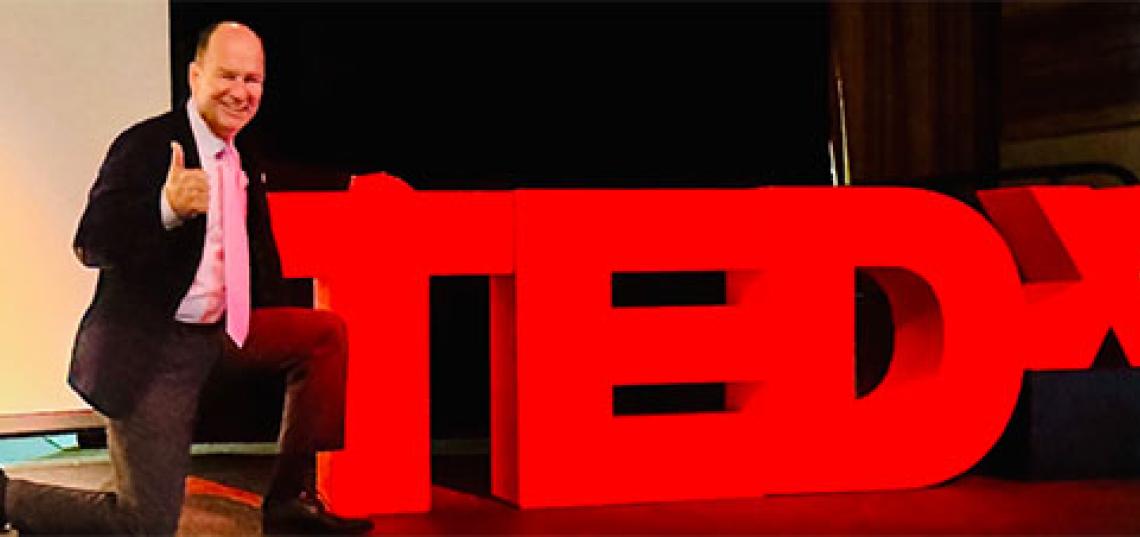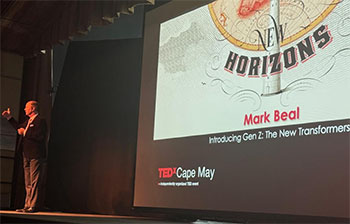
SC&I Assistant Professor of Professional Practice, Communication, Mark Beal recently delivered a TEDx Talk in Cape May, NJ focused on “Introducing Gen Z: The New Transformers.”
Nominated as a potential TEDx speaker by George Veras, a prominent executive television broadcast producer with experience working for ABC Sports, CBS Sports, NBC Sports and its Olympic Games coverage, Beal said he wrote his TEDx Talk speech to help “move the needle in the workplace” by opening the eyes and minds of current CEOs and other leaders (who are mostly Boomers, Gen X, and older millennials), to the need to evolve their workplaces to respond to Generation Z’s impact.
“Today’s leaders know they need to transform and innovate to appeal to Gen Z employees,” Beal said. “Employers who want to recruit and retain great Gen Zers must be flexible with work schedules. They need to offer hybrid work, remote work, and mental health days if they want to recruit, engage, and retain the next generation of great leaders,” he said.
Noting that the youngest Gen Zers are only 12 years old, Beal said, “Corporate leaders need to recognize that for the next decade they will be hiring Gen Z employees. Millions of Gen Zers will enter the workforce every year.”
In his talk, Beal traced the origins of Gen Z’s demand for a revitalized workplace culture back to the COVID-19 pandemic.
“In 2020 the workplace changed forever when the pandemic arrived,” Beal said. “Up until that point, most of us were commuting to an office for five or six days a week and working in person with our colleagues. All of that changed overnight. Companies immediately needed to pivot to remote work. In 2020, the oldest Gen Zers, now 27 years old, were just entering the workforce, so many of them still have never worked in an office or completed in-person onboarding. Instead, they’ve done their work via Zoom and other video conferencing tools, and they’ve proven that they can do everything from their computer and phones.”
TEDx Talk Prep 101
 Once Beal’s nomination was accepted in April 2024, he began to focus on the six months he had to prepare his 16-minute talk.
Once Beal’s nomination was accepted in April 2024, he began to focus on the six months he had to prepare his 16-minute talk.
“I practiced during drives to and from Rutgers, bike rides, and walks on the Rutgers campus to ensure there were no ‘ums,’ ‘ahs,’ and other filler words,” Beal said.
After approximately eight weeks of tweaking his speech and developing his talking points, Beal said he started to focus on his tone of speech, making a deliberate effort to speak slowly so his speech wouldn’t sound too “scripted” and so he could include some spontaneity in it. It took him two months of rehearsing his final speech before he felt confident.
The morning Beal arrived at TEDx in Cape May, NJ he said he went through dress rehearsals to test the mic and sound and get comfortable. He practiced his speech while the other six speakers at the event also prepared.
In comparison to the typical keynote speeches Beal has made in the past, such as at the BIG 10 Conference in Chicago and media interviews with NBC and Bloomberg, Beal said TEDx was a completely different experience, particularly because he would not have access to presentation slides to refer to during his speech.
“I had more butterflies leading up to this speech than I would have for a traditional keynote speech because TEDx has an audience of 300+ people and four to five cameras shooting from different angles to enable millions of people to watch. It made me more nervous in a good way. I wasn’t nervous to get up and speak, but I was nervous in the way that I wanted to deliver my monologue in an engaging, powerful, and entertaining way,” Beal said.
Part of the spontaneity Beal wanted to include related to how he was going to wrap up his speech. “During the middle and then toward the end, as I'm delivering the speech, I'm still thinking, okay, what are my final lines going to be? How do I end this? While I was thinking of this, and as I was speaking, an ending suddenly came to me, and I said it out loud: ‘Do you hear what I'm hearing? I hear a train whistle. That's the Gen Z train.’ I went into this, and I didn’t prepare for it,” he said.
Learn more about the Communication Department and major on the Rutgers School of Communication and Information website.
Photos: Courtesy of Mark Beal
